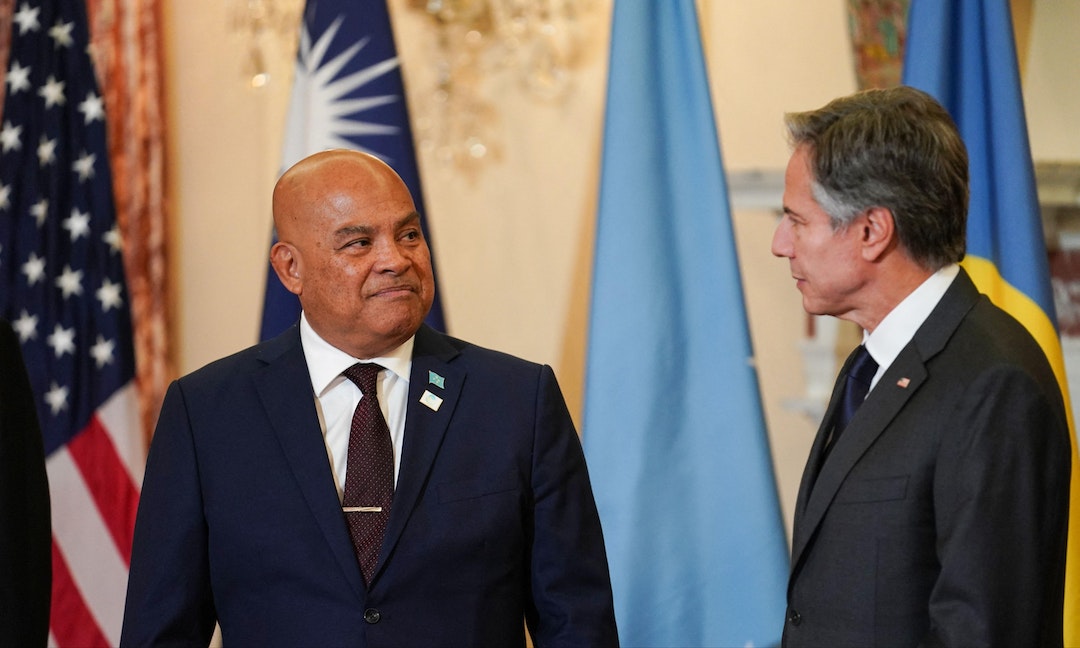
The Federated States of Micronesia has held talks with Taiwanese representatives about switching diplomatic recognition, reports say. If this happens, the Pacific island nation would be the first ally Taiwan acquires since the end of the so-called “diplomatic truce” in 2008. In this time, eight countries broke relations with Taiwan in favor of China—Burkina Faso, the Dominican Republic, El Salvador, Kiribati, Nicaragua, Panama, Sao Tome and Principe, and the Solomon Islands.
This week, Honduras announced its intentions to switch allegiance to China as well, leaving Taiwan with only two diplomatic partners in Central America, namely Belize and Guatemala. Taiwan used to have formal relations with all seven countries in this region.
How does a potential switch in recognition fit into Taiwan’s broader diplomatic efforts? I have written extensively about Taiwan’s efforts to gain diplomatic recognition and why a country would recognize Taiwan despite Chinese pressures. My cross-national research, available here and here, highlights Taiwan’s challenges.
As early as the 1960s, Taiwan used economic incentives as part of its strategy to maintain if not expand formal diplomatic relations. Critics often derisively labeled Taiwan’s extensive international aid packages as” checkbook diplomacy,” incentivizing waste and corruption, and while greater oversight exists now, aid remains a cornerstone of diplomatic efforts. However, now that China has the means and willingness to use international assistance as a diplomatic tool as well, Taiwan cannot afford to outbid China, nor does it wish to start a bidding war, which just encourages countries to play off both sides of the strait for their own benefit. Nor can Taiwan consistently appeal on broader economic terms as the Chinese market and Chinese investments usually outweigh any potential efforts by Taiwan. My research suggests that countries with limited exports would be more open to recognition, while Taiwanese aid packages, often aimed at economic development, risk providing these countries greater incentives to later switch recognition to China.
That said, some countries clearly have found it in their best interests to maintain relations with Taiwan or to still consider Taiwan as a viable alternative to China. If economic arguments are insufficient, Taiwan must find other means to appeal to formal diplomatic partners. One option has been to frame relations with Taiwan as support for a fellow democracy. Recently, concerns about Chinese influence or China’s failure to fulfill its economic promises, amid a greater anti-China sentiment in many democracies, have worked to Taiwan’s advantage. Outgoing Micronesian President David Panuelo accused China of waging a “political warfare” in the country including espionage, although he also stated the need for US$50million in aid as part of a switch in recognition.
We should also contextualize what recognition switches mean. In my research, I estimated that at least 15 countries would be open to switching allegiance. Will a switch by Micronesia lead to any of these countries following suit? The gain of a diplomatic partner attracts domestic and international attention and formal diplomatic recognition reaffirms Taiwan’s claims as a sovereign state against China’s claims that Taiwan is nothing more than a “province.” As national elections approach, a switch, stemming the tide of diplomatic losses, may help present an image that Taiwan’s push for international space has been effective. But a switch by Micronesia is unlikely to bring in additional diplomatic partners for Taiwan. This would likely require figuring out an acceptable combination of assistance packages and non-economic incentives, and China would use any loss to increase pressure to lure another country away from Taiwan.
Domestically, the effects of winning a diplomatic partner are unclear. Most Taiwanese could hardly name more than a few of their diplomatic partners, seeing the loss of an ally more as a data point within the broader context of cross-Strait relations where political parties suggest the gains or losses as evidence of the current administration’s commitment to Taiwan’s sovereignty. My research on Taiwanese public perceptions in 2018, 2019, and 2020 also shows that the public is supportive of these efforts at formal recognition, even if it harms relations with China, but not if it leads to increased demands for international assistance. However, no existing research identifies to what extent the public weighs efforts at diplomatic recognition against traditional policy areas like economic development or national defense.
Taiwan’s limited recognition is not a result of the country’s own incapacity but pressure from China. Efforts towards formal recognition with these small countries can only deliver limited additional benefits, not only because many of them are heavily dependent on international assistance, but that they cannot directly improve Taiwan’s security situation. Some analysts have questioned whether Taiwan needs any formal diplomatic partners at all, although I would argue that these remaining partners maintain focus on Taiwan’s unique situation and contribute to a form of predictability if not stability in cross-Strait relations. Rather, efforts at persuading interested states to recognize Taiwan must be paired with continued efforts to expand unofficial relations in every region, for example through bilateral trade agreements as a means to institutionalize relations with non-recognizing states, to the point in which the functional difference between these types of relations is hardly discernible.
READ NEXT: How Worried Is Taiwan About a Chinese Invasion?
TNL Editor: Bryan Chou (@thenewslensintl)
If you enjoyed this article and want to receive more story updates in your news feed, please be sure to follow our Facebook.







